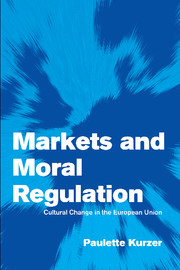Book contents
- Frontmatter
- Contents
- List of tables
- Preface
- 1 Markets versus morality
- 2 Binge drinking: the evolution of alcohol control policy in Finland
- 3 Our greatest social problem: anti-alcohol policy in Sweden
- 4 Nordic morality meets the European Union
- 5 Permissive pragmatism: drug control policy in the Netherlands
- 6 Harm reduction meets the EU: from public health to public order
- 7 Irish moral conservatism and European sexual permissiveness
- 8 The emergence of a European morality?
- Bibliography
- Index
4 - Nordic morality meets the European Union
Published online by Cambridge University Press: 16 October 2009
- Frontmatter
- Contents
- List of tables
- Preface
- 1 Markets versus morality
- 2 Binge drinking: the evolution of alcohol control policy in Finland
- 3 Our greatest social problem: anti-alcohol policy in Sweden
- 4 Nordic morality meets the European Union
- 5 Permissive pragmatism: drug control policy in the Netherlands
- 6 Harm reduction meets the EU: from public health to public order
- 7 Irish moral conservatism and European sexual permissiveness
- 8 The emergence of a European morality?
- Bibliography
- Index
Summary
As soon as Finland and Sweden joined the European Union, the state alcohol monopoly companies – Alko and Systembolaget – encountered a whole set of fresh challenges. By 1995, political and social pressure against drinking restrictions had already been growing and European Union membership intensified public impatience with the state monopoly companies. Finnish and Swedish citizens were acquainted with non- Nordic regulatory regimes and increasingly came to value the concept of the sovereign individual with autonomous decision powers. State regulations to direct consumption publicly were seen as a violation of this treasured autonomy. Until quite recently, it was considered normal for the state to tell people what makes them happy. But with the new mood since the late 1980s, Nordic people prefer to tell the government what makes them happy. Accession to the European Union only deepened the new ideological orientation towards individualism and personal responsibility, as seen in many different political economy domains.
The expert community contributed to the Europeanization of drinking attitudes. Specialists emphasized science and applied theoretical models to whole populations thereby lifting the moral burden off the drinker. No longer did public servants pretend to identify specific risk groups or individuals and no longer did they pass moral judgments on drinking per se. Only the consequences mattered and individuals were encouraged to assess the costs of their actions independently. The public health perspective normalized drinking, and subsequently, convinced people to demand less state intervention.
Nevertheless, genuine reform, let alone the abolition of state monopolies, was not on the agenda in the 1980s. Many critical observers anticipated enormous parliamentary resistance to proposals for limited deregulation and privatization and thus dismissed the possibility of altering the status quo.
- Type
- Chapter
- Information
- Markets and Moral RegulationCultural Change in the European Union, pp. 73 - 96Publisher: Cambridge University PressPrint publication year: 2001

